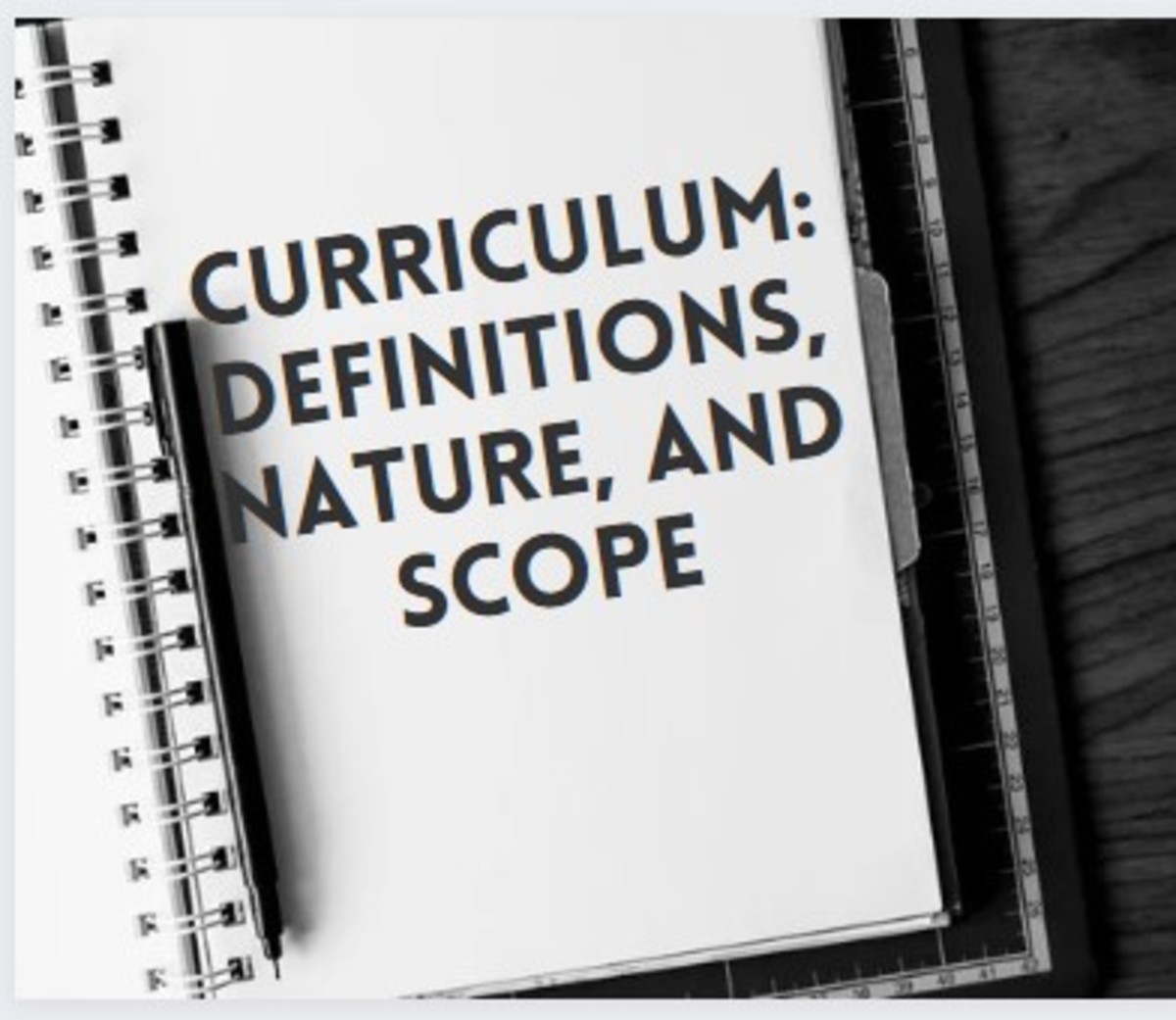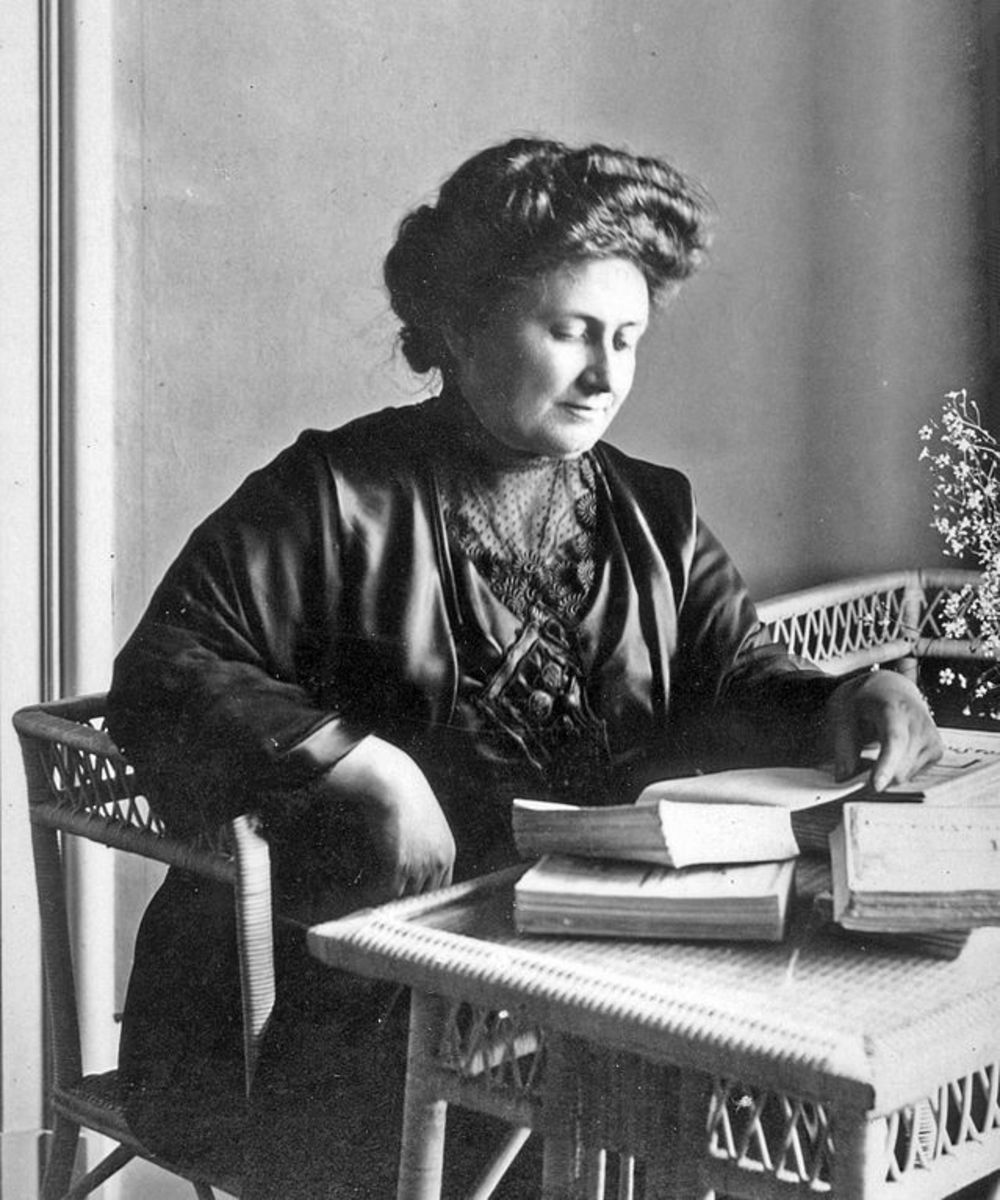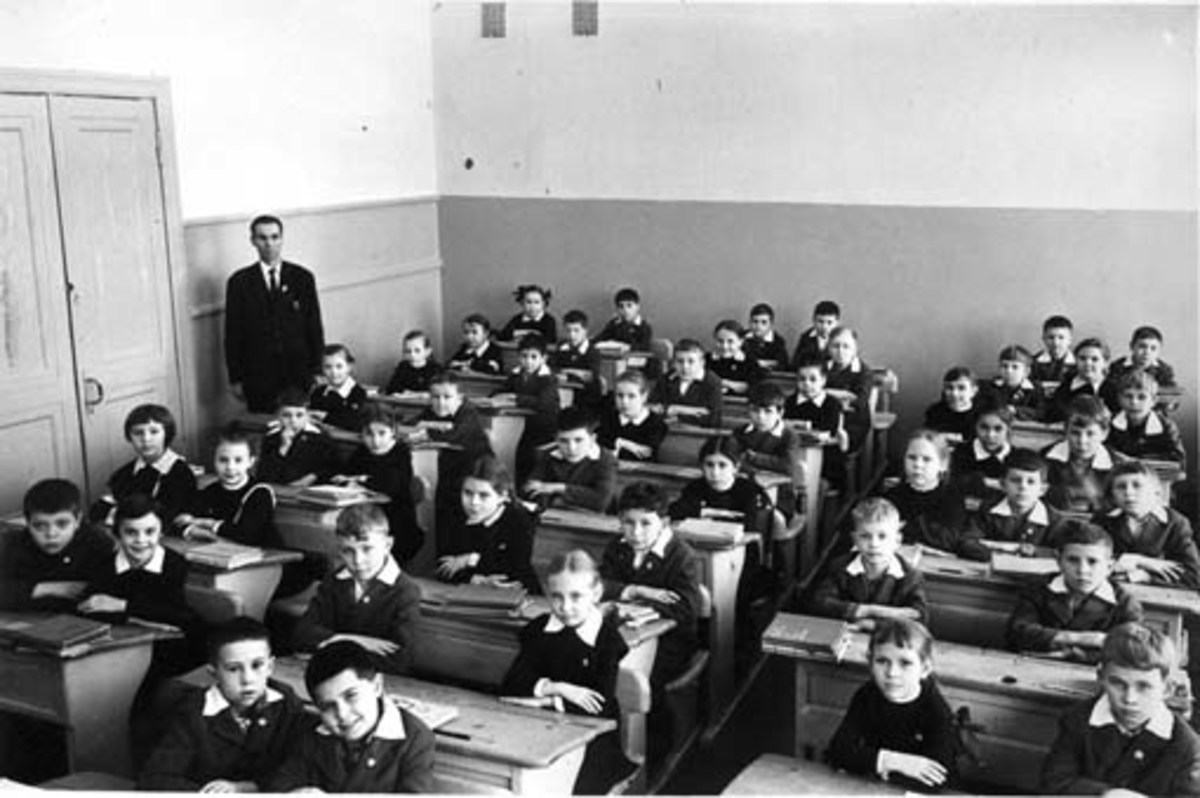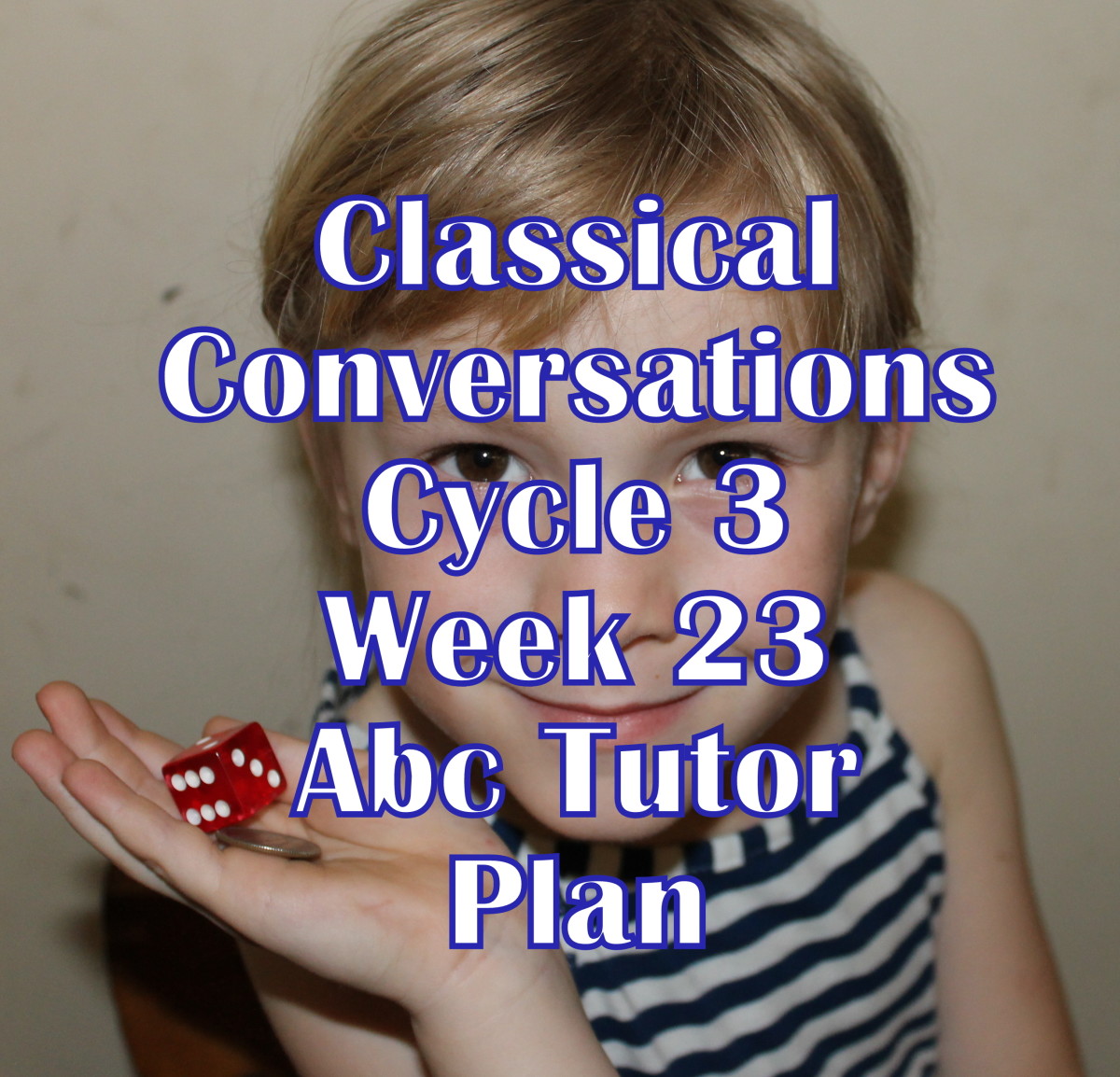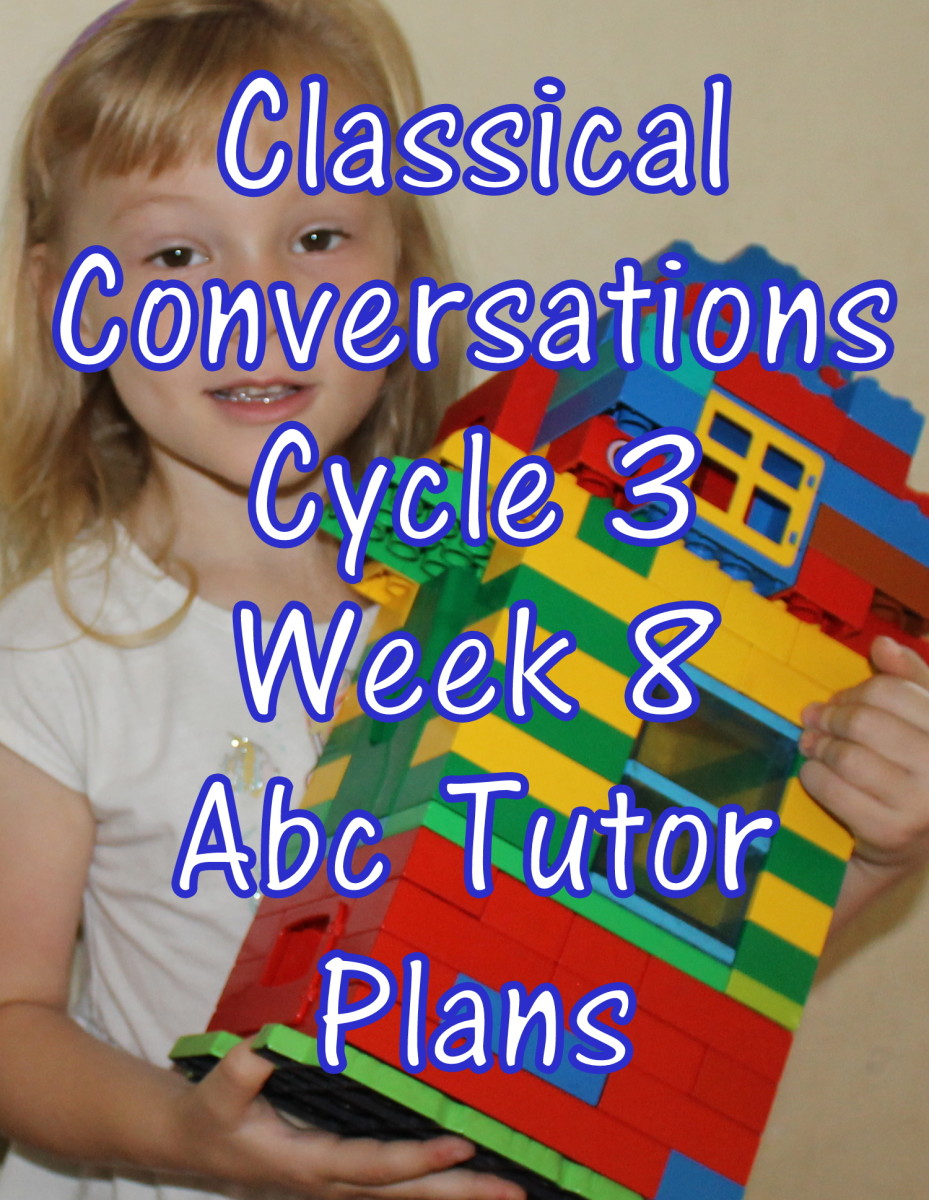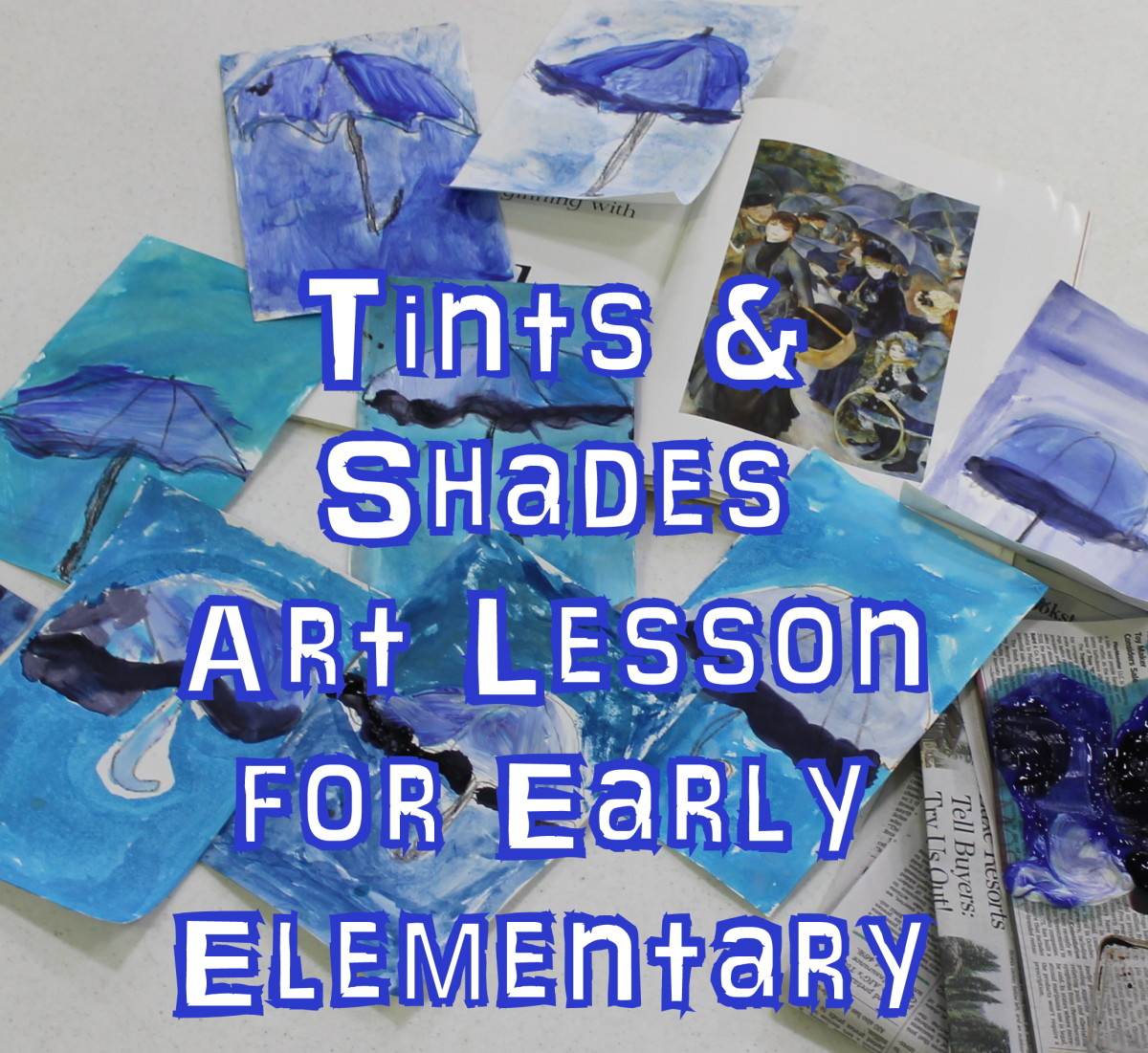Adult Education: The Benefits of Post-Compulsory Education - The Older Learner
Beneficial Outcomes
The results of education can be manifold. For example, as one 'betters' oneself, by gaining knowledge, one's self-esteem might improve, and one's confidence may then increase.
Active involvement in an interesting topic can result in the learner becoming a more interesting companion. Also, of course, becoming a member of a group of people with similar interests can generate new friendships.
These are outcomes which are not particularly defined as 'learning outcomes', but they are certainly beneficial.
These could be considered 'psychological' benefits, which might contribute to improved 'mental' health.
But there are also 'physical' benefits. While using the mind, one is exercising the brain ~ keeping it active and healthy.
Of course, education alone may not do this ~ one needs good food, exercise, fresh air, etc ~ but education is particularly beneficial for older learners.
Benefits and Rewards ~ Life-long Learning and the Older Student

Mental Abilities
During my late teens, when I was at school and college, it was often stated that one's mental abilities peaked between the ages of 18 and 28; and we students believed it! We were sure that, if we did not complete bour educvation, successfully, within the next few years, then we would have left it too late.
Yet now, it is accepted that education and learning are life-long activities.
A quote from 'The Age Heresy', by Tony Buzan and Raymond Keene, sums it up:
"Of course, any book that gives advice on improving mental powers can be equally applicable to an 8-year-old or an 80-year-old, or even a 118-year-old!"

Health Benefits
Some years ago, I read a newspaper article about a man, who discovered that he had alzheimers Disease. He was in his late 50s and he was devastated by the news.
However, he decided to try to fight this illness and concluded that, if he exercised his brain, then he might be able to improve it enough to counteract the decline being caused by the disease.
He attended various Adult Education classes; he learned languages; he read; he did anything, in fact, that he thought would stretch his mind and make his brain healthier.
When he returned to his consultant, there did not appear to be any further decline ~ and the gentleman in question felt more healthy and alert than he had done in a long time.
This was not seen as a cure, and, by now, his condition may, or may not, have deteriorated. I do not know. however, for a while, at least, education was a better remedy for this man's illness than was any medicine.

Challenging 'Older Learners'
In 'Older Learners; The Challenge To Adult Education' (edited by Johnston and Phillipson), Ian Walker devotes his chapter to the creation of learning environments in institutions, which care for the elderly.
He gives details of a nursing home, in the USA, caring for sixty-seven elderly patients.
In 1976, sixty-six percent of these people were classified as 'heavy care'. By the following year, only nine percent were so classified.
The main reason for this significant reduction seems to have been 'a programme of restorative activities'.
Such activities are used in a number of homes and hospitals in Britain as well as America. Examples of these activities include: games, such as whist, scrabble and bingo; outings; musical events; films; talks; craft classes; languages; gardening; poetry and reading; local history; dance therapy; yoga ~ and other suitable options.

Older Learners
British Example
A memorable British example, of education improving health in the elderly, is given by S. Jones in 'The Educational Experience in Homes and Hospitals'. it is quoted by Ian Walker:
Mrs. H.
Aged 83.
West London hospital patient.
Chairbound.
Severe arthritic and stroke difficulty.
Indifferent to surroundings and frequently incontinent.
Difficulty in moving chair about.
Scored low in Hodgkinson mental test.
Persuaded to attend twice-weekly art class.
'Three months later: ... marked physical improvement. When previously needed two nurses to propel her wheelchair, now wheels herself about unaided. She is still chairbound, but now only requires minimal help with dressing and feeding and is much more co-operative with staff. Washes herself, cleaner in her habits, completely continent ... brighter mentally. Most dramatic improvement noticed by all staff and her daughter, who says she is brifhter and easier to talk to. Mental score 7 out of 10.'

Joyce Brothers
Dr Brothers
In 'What Every Woman Should Know about Men', the American psychologist, Dr Joyce Brothers, discusses the problems of middle-aged and elderly men ~ particularly the retired.
She talks about depression and even death ~ and she puts many emotional and physical health problems down to lack of purpose and lack of friends.
She comments: '... when a man retires, unless he has prepared himself for this state, he often has the feeling that he has lost his identity and status ... he begins to feel nostalgic about the time when he was 'somebody' ... ' and 'anything a woman can do to encourage her husband to become active in the church or the community, to enrol in a language or photography class, ... to sign up for a callisthenics or swimming programme is on the plus side.'
*
Joyce Brothers is, apparently, still very active, herself. She was born in 1927 and in 2011 was advertising a home safety monitor on TV!
See: http://www.alertusa.org/commercial.html
Joyce Brothers - Born 1927
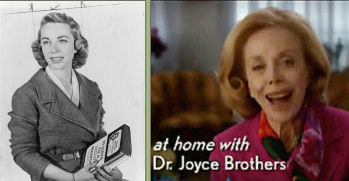
'Waiting for God'
We can see that education classes for older people can have real health benefits.
This is something for governments to consider, when worries arise concerning the costs of caring for the elderly, as the average age of the population increases. It was pleasing to see that England had appointed a minister for Life-long Learning.
Adult education can enhance the quality of life for some of the loneliest people in the country ~ people, who often feel that they are of little consequence ~ and who have very little of consequence going on in their lives.
As the situation comedy of the same name implies, once people enter a home for the elderly, many of them are just 'Waiting for God'.
[See: http://www.bis.gov.uk/ministers/john-hayes]

Geared To The Older Learner
Success
Without meaning to sound in any way patronising, I would say that society must note that the older learner can ~ of course ~ take part in educational classes, perfectly successfully, provided the classes are correctly geared to their needs and wants.
The myth about losing one's mental capacity as one ages is just that ~ a myth.
Indeed, in many cultures, the words that go with great age concern experience and wisdom, rather than degeneration and senility.
Here, in the UK, old age is often viewed in a negative way
As quoted by Buzan and Keene:
'For many [men], the half century is bringing an end to careers they thought would go on a lot longer and, they hoped, further. ... they are cast as the fat being shed in the latest corporate diet plan.' And these men are only 50! [1996]
Apart from the fact that education could boost the self-esteem of such men; provide a target for their ambitions; help them to make friends; give them a purpose in life and contribute to their improved health, it could also help them to retrain for a new career.
According to their site, the 'University of the Third Age' states that "U3As are self-help, self-managed lifelong learning co-operatives for older people ..." and they publish useful educational books, especially for the 'older and wiser'.
[http://u3a.org.uk/home.html]
Some U3A Books
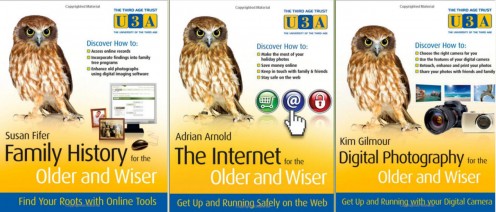
Elderly Philosophers
Most of us will have seen quite elderly writers, politicians, professors, war veterans and others being interviewed on television ~ and we have probably marvelled at their abilities; their story-telling powers; their memories; their knowledge of times past and their willingness to philosophise on times present.
Probably, we have also seen sad old people, institutionalised in old people's homes, or sitting, alone, in their own homes.
Is it that the former are intrinsically different?
Are they lucky, because they have interesting lives, and are more alert? ~ Or are they more alert, because they lucky enough to have interesting lives? There is a difference.
*
For example, the retired UK politician and academic, Shirley Williams, 1930 ~ The Right Honourable The Baroness Williams of Crosby ~ is clearly intelligent, learned, articulate and interesting. In her early 80s, she is still formidable is televised debates
Shirley Williams at Birmingham 2010 - Aged Almost 80
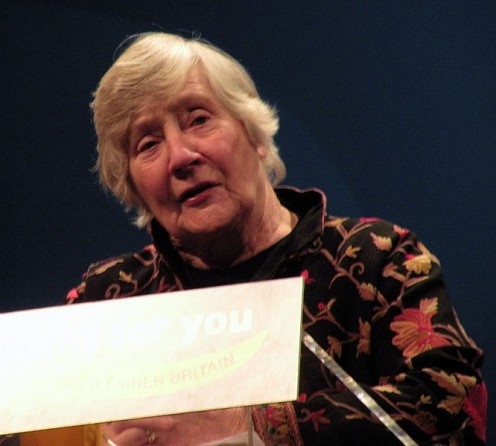
Tony Buzan - The Older Brain
Buzan and Keene: 'The Age Heresy'
Here are some more quotes from Buzan and Keene, whose book is subtitled 'You Can Achieve More ~ Not Less ~ As You Get Older.'
They confirm that older people are able to be extremely skillful in their chosen field and, therefore, they also prove that older students can be very competent learners.
'Tony Buzan was becoming increasingly impressed, on his worldwide tours, by the inquisitiveness and extreme readiness to learn of his older listeners.'
'... the work of the great geniuses tended to improve as they got older. ... Goethe, Shakespeare, Beethoven, Michelangelo ... . In many instances, their supreme masterpiece was their final work, produced in extreme old age.'
'The autopsy on Einstein's brain ... revealed 400% more glial cells than the norm. Since these cells specifically aid inter-connectivity in the brain circuits, the effect would have been to boost his power of association ...'
'In his 80s, Sophocles was charged by his son that his mental faculties had waned ... Sophocles' son took him to court, with the aim of publicly proving the decline in his father's mental abilities. ... Sophocles conducted his own defence: "Here is the script of a tragedy, which I have just completed, if you doubt my mental competence, take the script away and I will recite it in its entirety". ... when Sophocles reached the second act, without having made a single mistake, the case ... was thrown out of court.'
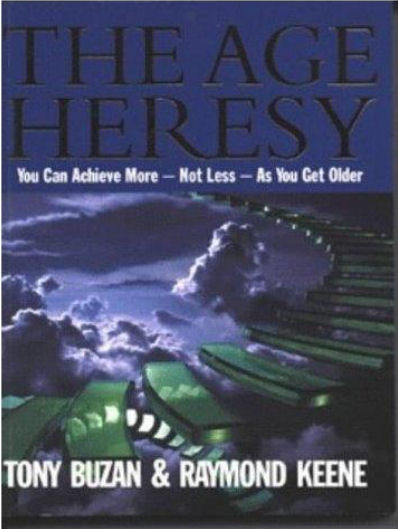
Einstein and Co
When Einstein died, leaving that unusually well-developed brain, he was 76 years old.
*
Goethe was 83 years old, when he wrote the second part of his 'Faust'. This was in 1832, the year of his death.
*
Michelangelo, the Renaissance genius, was aged 89, when he died.
In his last years, he was chief architect of St. Peter's ~ and, consequently, of its dome.
Einstein's Death - Aged 76
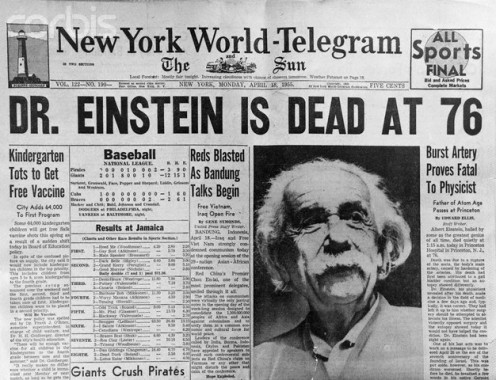
Use It Or Lose It
On 29th December, 1999, Christine Doyle wrote an article, for 'The Daily Telegraph', concerning health and the brain. The title includes the words 'Your Brain Needs a Workout, Too'.
A spokesman for 'Research into Ageing', which funds studies to improve the quality of older people's lives, is quoted as saying "It really is a question of use it or lose it".
The article stresses the need for good nutrition, plenty of drinking water, and exercise ~ but it also mentions brain games, and activities which involve study!
Michelangelo at 72
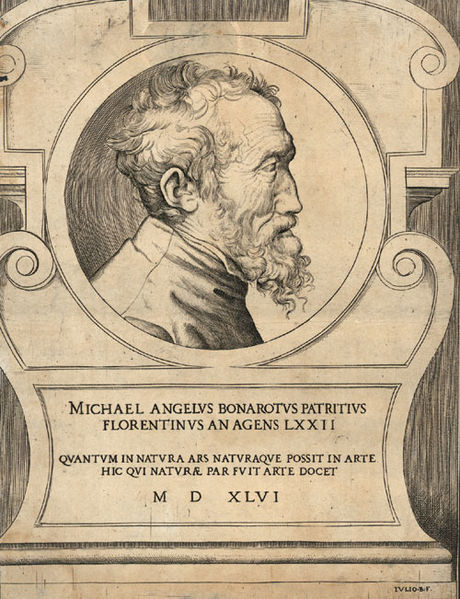
The Elderly?
Since it has now been realised that older people are generally quite capable of participating in education geared to their needs, and that such education is beneficial, not only to the individual, but to society in general, what should be done?
First, whom do we mean by 'older learners'? ~ Some people might find it insulting to be categorised thus. People of only 50 have been mentioned in this item ~ surely they are not 'old'?
The point is that they were perceived as 'old' by the employers, who had had power over their lives ~ and they were subsequently left feeling 'past it'.
In these circumstances, they were labelled as, and probably felt, 'old'.
The terms 'old' and 'older' will certainly cover those in homes or hospitals for the elderly ~ but will also include anyone who has been made to feel 'elderly'.

What To Do?
What should be done for the 'elderly' in terms of education?
Many retired people attend dance classes ~ they learn; they exercise; they socialise.
Many others belong to the 'University of the Third Age' (U3A), where they hear ~ and can take part in ~ lectures and debates. This gives them ample stimulus.
Adult Education classes and Open Studies classes are generally priced more cheaply for senior citizens. Because of this, and the fact that many classes are available during the day, they are well attended by the retired. Some senior citizens enrol on university degree courses.
Others attend clubs, local history societies, etc etc.
Those who take part in these activities are probably the people who are enjoying their 'old age' ~ the ones who seem young for their age.
It is the lonely, house-bound people, and those in institutions, who need more consideration.
What can be done for them ~ to improve their lot?
Generally, the government has tended to see education as being relevant only to the young, and to unemployed adults, who need to re-train.
Yet newspapers often report on the drop in the birth rate and the potential problems of an aging society.
Perhaps the government should give serious consideration to providing organised educational facilities, in residential homes for the elderly. It could reduce the need for medical expenditure and for high maintenance care.
In the meantime, perhaps those who are working in, or who have worked in, the field of education could take it upon themselves to provide this service on a voluntary basis. Indeed, some already do!
[U3A: http://u3a.org.uk/ ]

Personal Experience
My late grandmother, when she was 95, had to spend a short time in a residential home, for respite care.
This was her first such experience and she said that it was a lovely place with lovely staff.
After only one week, though, I could see a real difference in her. She seemed to be deteriorating noticeably. For her age, she was actually quite fit at the time, yet she became very reliant on her 'zimmer' frame and , indeed, rarely left her room. She became somewhat listless and started to go to bed very early.
However, on two of her days, she was given the opportunity to join a small group activity. One was an exercise session and the other was a craft session. She thoroughly enjoyed them, took part keenly and conversed with the tutors.
She said that the tutors were hoping to have her in their groups the following week, but she would be returning home then. My grandmother believed that they welcomed her presence because she was the only one who joined in ~ she had not, yet, become institutionalised!
As we have seen, though, research has shown, that this process of institutionalisation can be reversed, if enough classes and interaction are available to residents. It seems that more tutors need to be willing to go in, more often, to help.
Comedian George Burns - An Active Mind Until His Death at 100

Personal History and Memories
History - My Subject
My own subject is history.
What can 'History' offer?
Many older people are only too happy to talk about their early days ~ this is how 'oral histories' may be acquired.
A project, conducted by Birmingham Central Library (UK), a few years ago, involved their home visiting team.
To increase their historical resources, and to show interest in and respect for, older citizens, they recorded interviews with members who were over 90 years of age.
It was very rewarding and productive on both sides.
This is something that could be done in private and residential homes by history tutors.
Indeed, I have worked on such a project, myself.

Local and Family history
Both Local History and Family history are popular interests.
It would appear that these are subjects, which seem to become more attractive, as people grow older.
Both subjects are educational and allow for valuable conversations. Slides and photograph albums make ideal resources to use in such sessions.

Help To Remember
I noticed that one lady, who was living in the residential home that my grandmother visited, was very confused. She said that she wanted to go home, but could not remember where home had been.
I noticed her Welsh accent and commented that my mother was from Wales. For a few seconds, there was almost a sign of recognition in her expression. She said: "I am from Wales, but I don't know where." Then she became a little more muddled and said: "I think I'm from Wales. I don't know." Sadly, she ten lost track of the conversation completely.
Could she have been helped by a 'lesson' about her home town ~ with pictures? Would a recording of a male voice choir have been beneficial, perhaps? Could tutors use their skills to improve the life and health of ladies like this?

Music
With reference to music, when my father was in hospital, with his final illness, I took in some tapes of his favourite singers and musicians, from the 1940s.
I was concerned that these would disturb the other patients, but they loved them.
The music made them feel better, because it was from their own era.
One ex-dance teacher, who now had trouble walking, insisted on dancing to Fred Astaire, and Glenn Miller, using a high-backed chair as a partner.
From this experience, I concluded that music classes ~ the 'right type' of music ~ would probably be very popular in homes and hospitals.
The elderly can revisit their own pasts via music. This could be linked to social history classes or to oral history projects.
I know that musical classes and events are very popular in the local over-sixties club.

Widower 'Saved'
According to an article in the 'Times Educational Supplement', a man named Fred Moore was once the oldest man in Britain.
At 107 years of age, he claimed that when his wife died, two years before, his art lessons 'saved his life'. They enabled him to keep going at an incredibly difficult time in his life.
"Instead of sitting and crying about it, I decided to get on with my art."
[Mr Moore died in 2002, at the age of 109 years.]
*
About Fred Moore:
http://news.bbc.co.uk/local/kent/hi/front_page/newsid_9427000/9427933.stm
http://news.bbc.co.uk/1/hi/england/1939959.stm
http://www.tes.co.uk/article.aspx?storycode=329785
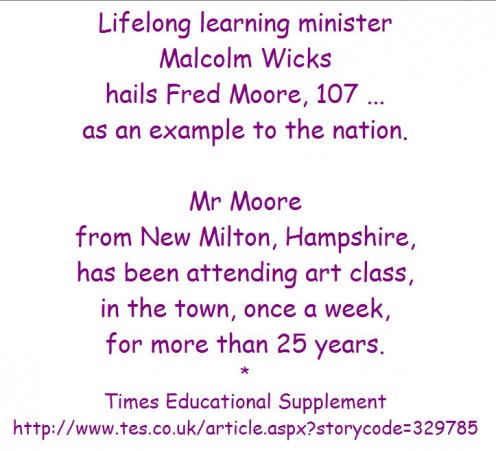
Feed Both Mind and Body
To keep the elderly youthful and healthy, they need a strong body and an active mind.
Both mind and body need to be well-nourished ~ with good food and interesting learning opportunities.
Knowledge and ideas are the food of the soul ~ and the world of education must provide for those who require it.
Many can go to educational establishments, in order to provide for their learning needs, but, for those, who are not in a position to do so, the educational establishments must, with their permission, and, hopefully, by their invitation, take learning opportunities to them.
Teaching (Dutch1662)
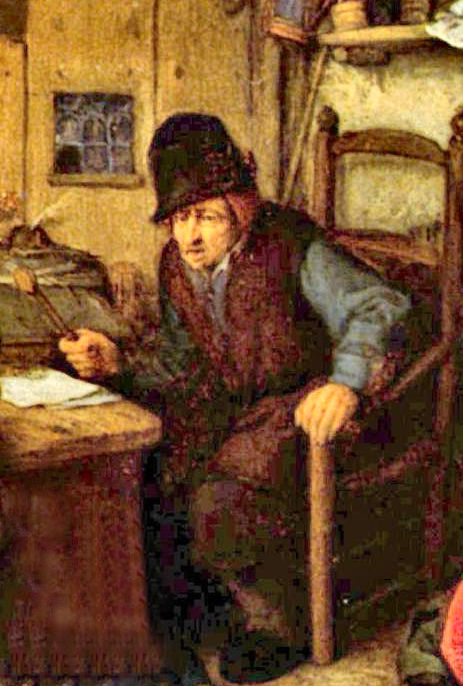
Life-Long Learning
Rewards
As an Adult Education Tutor, I taught a group of students, who were aged between about 50 and 96.
The majority were aged between about 60 and 75.
I taught them for six years.
The students attended, because they wanted to attend. They were keen, interested and intelligent.
They were a joy to teach ~ and I learned as much from them as I ever taught them.
Including the older learner in Adult Education classes is rewarding and beneficial for both teacher and student!
I recommend it ~ to students and teachers ~ and the government!
'Old Woman Dozing' - But She Has Also Been Reading (Two Books) And Lace-Making!
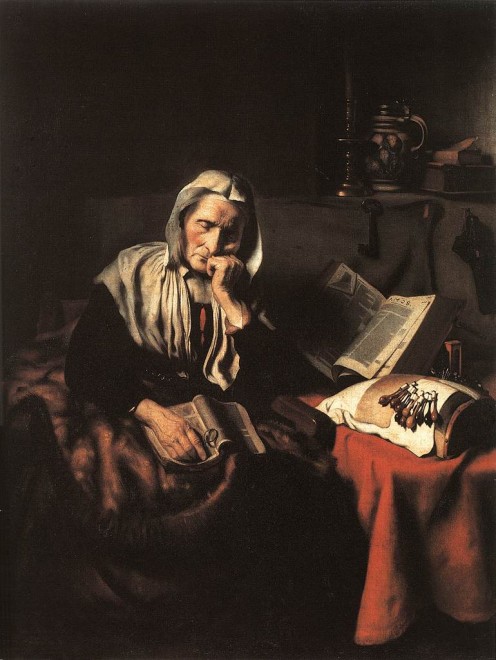
Teaching Accreditation Programme
This item is based upon an essay I wrote, as part of a 'Teacher Accreditation Programme', for 'Adult Education' tutors, in 1999-2000.

References
'Older Learners, the Challenge To Adult Education' ~ Susanna Johnstone & Chris Phillipson (Eds) 1983
'The Age Heresy' ~ By Tony Buzan and Raymond Keene. 1996
The Oxford Companion to the Mind ~ Richard L Gregory. 1987
What Every Woman Should Know About Men ~ By Dr Joyce Brothers. 1985
The MacMillan Encyclopedia ~ 1988
Birmingham City Library Over-90s Home Visits Project. 1999
Times Educational Supplement. F E focus. January 14th 2000.













